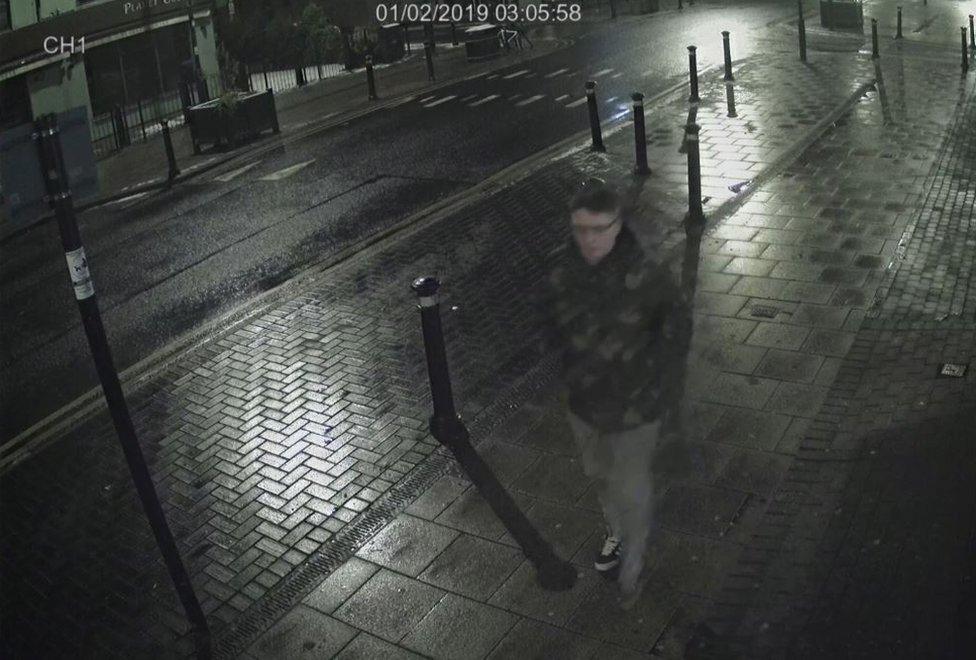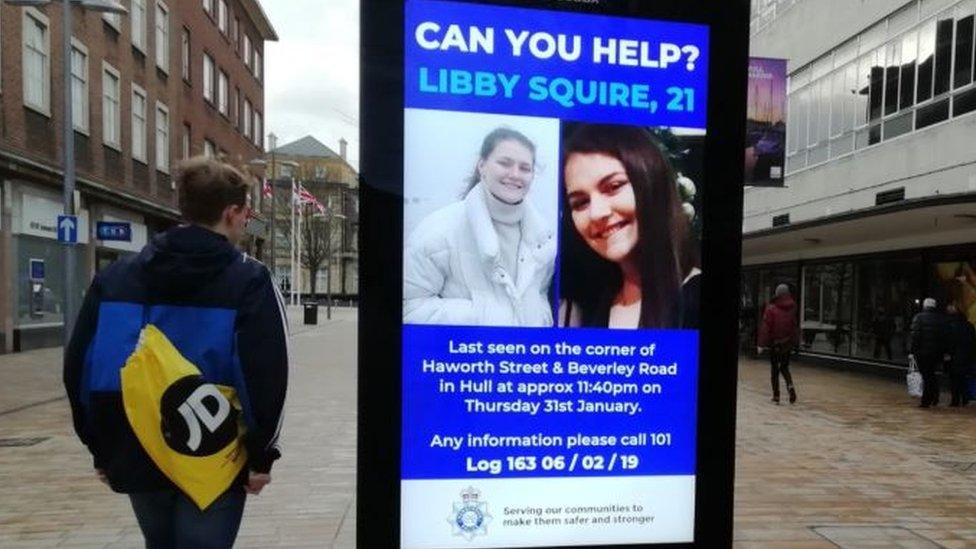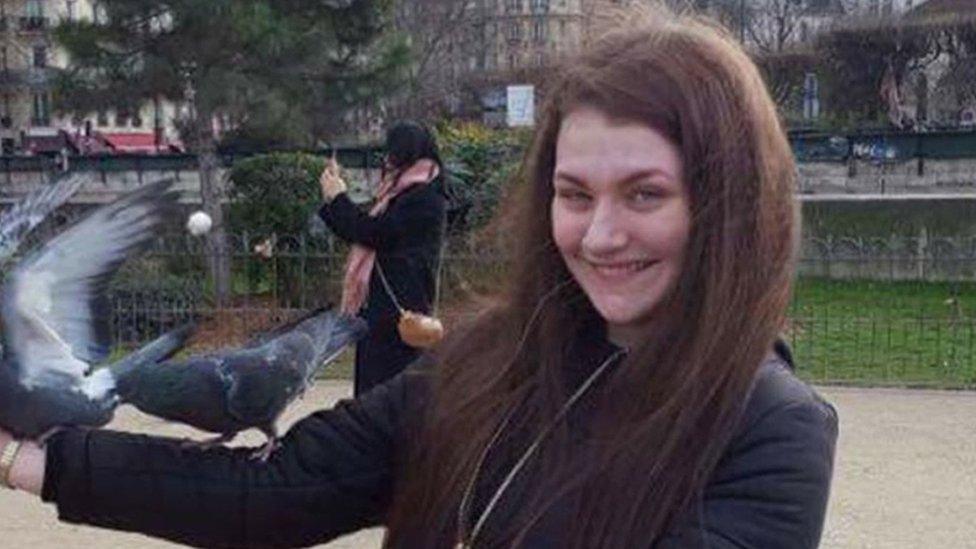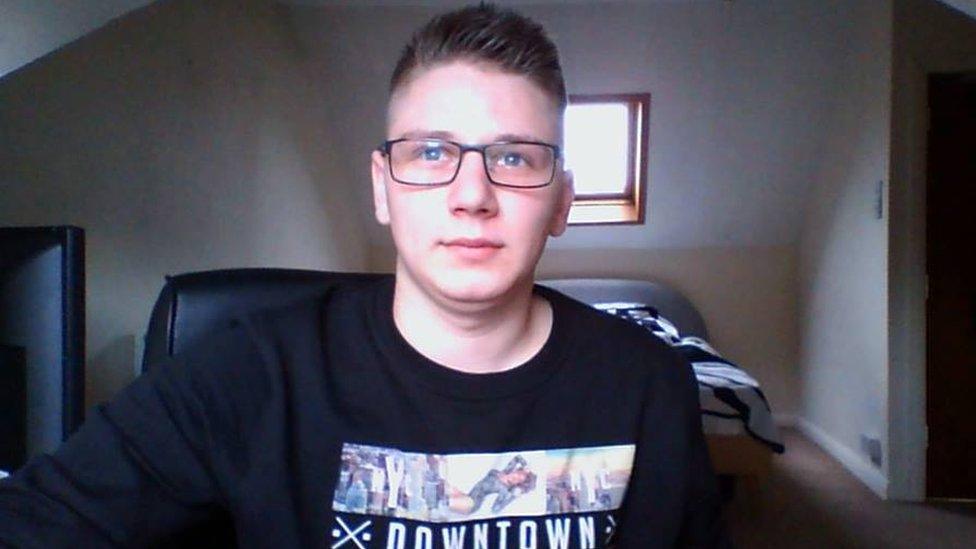Libby Squire murder: Pawel Relowicz's path from peeping Tom to killer
- Published

Pawel Relowicz displayed "predatory behaviours of a sexual offender"
Pawel Relowicz has been convicted of raping and murdering student Libby Squire. But she was not the first woman he targeted. In the months before her death, he prowled the streets of Hull committing a string of increasingly serious sex crimes. His first known victim has described her encounter with the peeping Tom who became a killer.
Sarah (not her real name) was sharing an intimate moment with her boyfriend.
It was a July evening in 2017, and the window of her downstairs bedroom at the front of a shared student house was opened slightly. Suddenly, the room brightened with the light from an outside street lamp, and she looked up to see the "terrifying" sight of a man's hands and face poking through the curtains.
Seconds later, Sarah's then partner also turned to look at the window. This startled the unwanted spectator, who fled. Three hours later, at about 04:00 BST, her housemate returned home from a shift at a local bar to find a used condom and a pair of worn, black lacy knickers hanging on the front door handle.
The man, she now knows, was Pawel Relowicz. This episode of voyeurism was the first in a catalogue of escalating sexual crimes he committed in the 18 months leading up to the disappearance of Libby Squire.
His trial at Sheffield Crown Court heard he had stolen sex toys and underwear from student houses and masturbated in front of women in public. A used condom and a pair of knickers - described as a "calling card" by prosecutors - were left at more than one crime scene. In one case, they were discovered beside a toy belonging to a victim's child.

Relowicz, who lived in the student area of Hull, would patrol it looking for opportunities to offend
But, in the earlier stages of his offending, it seemed that few took the potential threat seriously. Sarah, whose name has been changed for legal reasons, said the reaction from those around her to what had happened initially led her to feel as though she was "blowing it out of proportion".
"I don't think my boyfriend took it very seriously, my housemates didn't take it seriously. I think they just thought it was funny… but I didn't find it funny at all," she says.
"Everyone else had played it down... [but] I knew something was very wrong.
"I always had a feeling that this was going to be somebody who wasn't going to do it just the once."
The police response when she first reported the issue further compounded the feeling. She was "unimpressed" when officers arrived a day later to take fingerprints only after her mum - herself a former policewoman - nudged them.
Sarah's experience was perhaps unsurprising, according to criminology professor David Wilson. Traditionally, voyeurism is not viewed as a serious crime but as the subject of mirth and merriment, he says.
"It wasn't so long ago that peeping Toms would feature on so-called humorous postcards that you would send to family and friends when you are visiting the seaside. Culturally we've not taken the behaviour of voyeurism seriously for a very long period of time. There's a tendency to think of the peeping Tom almost as an insignificant joke-like character, whereas in fact they cause a great deal of harm and hurt.
"They are predatory sexual offenders and should be treated as such."

On the night Libby Squire went missing, the married father-of-two was seen walking along Newland Avenue in the early hours of the morning
Sarah was haunted by Relowicz's crime against her. Within days, she had the locks changed and a small CCTV camera installed with help from her parents. But that did not stop her from feeling "absolutely petrified", particularly when she was alone in the house. At one point, she recalls keeping a set of gardening shears under her bed "just in case".
"I'd lock my bedroom door at night and I wouldn't even leave to go to the toilet. I had a summer job and I ended up quitting and going back to my family home because I couldn't be in that house. And then when I went back in September that's when it started up again. It became this massive fear."
Sarah says she remained "very, very frightened for nearly a year". She recalls several times experiencing a sudden "intense burst of fear" when walking at night.
As she tried to leave behind the nightmare of Relowicz's voyeuristic episode, he continued to offend undetected. He watched through the blinds of a woman's home as she came out of the shower, spied on another as she got dressed and watched on as one danced around her living room in leggings and a bra. The same victim also reported seeing Relowicz's hands coming through her letterbox less than a month later. Voyeurism turned into burglary and, in one case, he stole three sex toys from a house, ignoring high-value items such as laptops.
In January 2019, weeks before Ms Squire's disappearance, he was seen masturbating in the street on two separate occasions. The women who witnessed it said he appeared untroubled at being spotted.
Up to now, the crimes were not being linked. But Sarah, and others, would be hit with another bombshell a year and a half after she first encountered Relowicz.

Libby Squire was missing for almost two months before her body was recovered
News that a University of Hull philosophy undergraduate had been reported missing on 1 February 2019 sparked a huge search around the city for Libby Squire. Seven days after the student, from High Wycombe, was last seen in a drunken and vulnerable state, Polish national Pawel Relowicz, a married father of two, was arrested on suspicion of her abduction. Details of his previous crimes soon began to emerge.
Sarah says she had an initial reaction of "disbelief" when she learned of Relowicz's arrest but wasn't surprised there were other victims of his serial offending, including those he followed home and stared at through windows while they were either naked or in their underwear. She took some small comfort in knowing she "wasn't just neurotic and making something up", but "felt sick reading about him".
On 20 March 2019, the worst was confirmed. Libby Squire's body was found in the Humber Estuary.
"I was disturbed by how quickly it seemed to escalate," Sarah says. "Things like masturbating in front of people, following them home, I mean that stuff's terrifying. That's far worse than what he did at mine. I just felt terrible for these women. It was just gradually getting worse."
Footage of Libby Squire and Pawel Relowicz's movements was shown to jurors
Relowicz was jailed in August 2019 for eight charges including voyeurism, outraging public decency and burglary. The 26-year-old was already serving a five years and eight-month jail term for these offences as he faced trial for Ms Squire's murder. The judge who jailed Relowicz said he was a potentially dangerous individual motivated by "perverted sexual deviancy".
At his murder trial, Relowicz would tell the jury of five men and seven women he was not the "phantom killer in tight trousers" portrayed by prosecutors, but a hard-working family man whose crimes were the result of a fetish driven by problematic sexual urges.
But according to Prof Wilson, Relowicz's description "trivialises what he's done". The criminologist believes he showed signs of "predatory behaviours of a sexual offender" and a more accurate term would be paraphilia - a condition characterised by perverted or irregular sexual desires. He says Relowicz's actions were about having power over his targets.
"It's not about him trying to express himself sexually because he's got some kind of fetish," he says. "He wants to be powerful and he gets off, as it were, simply when he sees the reaction of people watching him behaving in the way that's been described [in court]. He wants somebody to be shocked and annoyed and scared because that ultimately makes him feel more than he actually is."
Prof Wilson says the problem "didn't just start last month or six months ago". "This problem has been in Relowicz's background for years and it has been allowed to go untreated," he says.
He says there are interventions to tackle the kinds of behaviours mentioned during the case, but it is "something that needs to be dealt with very, very quickly", preferably during puberty.

Sarah described Libby's death as "a wake-up call"
Sarah's experience still plays on her mind.
"I get these thoughts - should I have done something, should I have gone after him? Could we have made the police take it more seriously? All these things go through your head. But you know ultimately there's nothing you could've done really."
"That makes me think: 'How many people were either embarrassed or blamed themselves and never actually reported it?'"
Anthea Sully, chief executive of White Ribbon UK, says people should "call out behaviour that they think is wrong". The charity, which works to prevent violence against women, encourages people to report apparent low-level behaviour, and wants to raise awareness of the mechanisms for doing so, external.
"We know that people will often dismiss it as not being important and people don't recognise that it's harmful, but it's also something that can escalate," she says. "So it's absolutely essential that we take these things seriously."
It is important to remember, says Prof Wilson, that "sexual offenders are upstanding members of the public as much as they are the so-called dirty old man in a raincoat."
"If we could identify a sexual offender because they had horns on their head and a long pointed tail it would be much easier to identify a sexual predator, but unfortunately they don't," he adds.

Polish-born Relowicz worked as a butcher in Malton, North Yorkshire
Humberside Police said there were very few opportunities to link Relowicz's earlier crimes until his arrest as there was "no clear pattern of offending" and a large gap between offences. With regard to Sarah's complaint, the force said it was satisfied "a proportionate investigation with the information available at the time" took place and it had treated her report "with the appropriate level of seriousness". Det Supt Martin Smalley said different crime scenes yielded different types of evidence and it was "not possible to compare and match one against the other".
"In some cases it was fingerprints, in another, it was a footprint and in others it was DNA," he says. "Despite a number of offences being committed, officers were unable to connect these to each other or to Pawel Relowicz until a much later date." The force added that "officers acted quickly" to identify, locate and apprehend Relowicz within days of Ms Squire's disappearance.
Sarah had no idea what Relowicz would go on to do. She describes learning about Libby Squire as "a wake-up call". "This poor woman who'd struggled throughout her teens, managed to get to uni, had friends, had a good life and it was just snuffed out prematurely. I just found it deeply upsetting. I went out for a walk and I just cried, I just felt so sorry for her and her family and everyone and it's just horrible," she says.
"And to think this man two years earlier, maybe months earlier..."
With Relowicz convicted, Sarah's feelings about her own experience are complicated, and she says thoughts of forgiveness are made harder by knowing that he physically harmed another woman.
"I do hope he gets the support he needs but at the same time... there was no excuse for what he did," she says. "It's damaged people… he's scared people in their own homes and no matter what the extent of his problem, that's unacceptable."